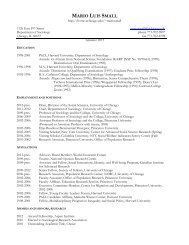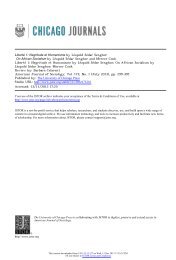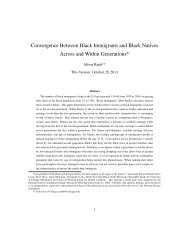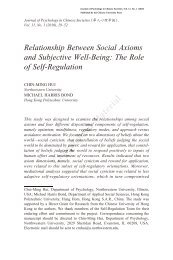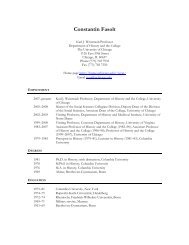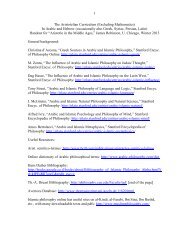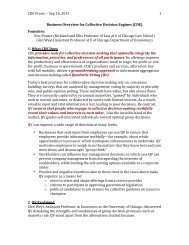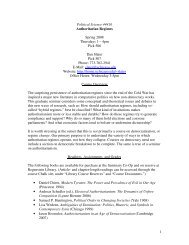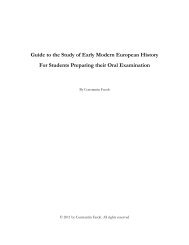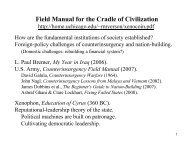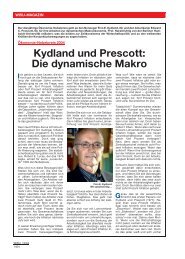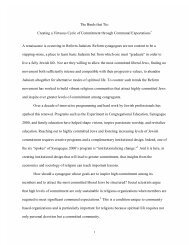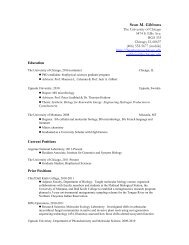Job Market Paper - Personal Web Pages - University of Chicago
Job Market Paper - Personal Web Pages - University of Chicago
Job Market Paper - Personal Web Pages - University of Chicago
You also want an ePaper? Increase the reach of your titles
YUMPU automatically turns print PDFs into web optimized ePapers that Google loves.
Kim: Endogenous Choice <strong>of</strong> a Mediator<br />
g(σ 1,1 (w|w)) ∈ (0, 1) if σ 1,1 (w|w) = 1 2 , and g(σ 1,1(w|w)) = 0 if σ 1,1 (w|w) < 1 2 .27 Then, player 1<br />
(the vetoer) <strong>of</strong> a weak type would expect to get the pay<strong>of</strong>f <strong>of</strong> zero if he disagrees, and G µ 5/17,0<br />
is<br />
played. But he would also get the pay<strong>of</strong>f <strong>of</strong> zero if he had voted for the alternative µ 1,0 . Under<br />
this belief ¯q 1,1 (w) = 1 and equilibrium strategies, a strong player 2 does have an incentive to not<br />
veto, satisfying (T7). For the alternative mediator µ 1,0 , after a veto on µ 1,0 , the players’ beliefs are<br />
restricted to a credible vote belief that satisfies (ii) <strong>of</strong> Definition 2. Lastly, µ 1,0 satisfies (T3) for<br />
both types <strong>of</strong> player 1:<br />
U 1 (µ 1,0 |w) = 3.6 ≥ 0.85 · (1 − ψ ′ 1,1(w)) · ( ∑ r∈R<br />
σ 1 (r|ww) ∑ d∈D<br />
µ 5/17,0 (d|r 2 , ˆr 1 )u 1 (d, ww)),<br />
where the right-hand side is always less than or equal to 3.6 for any ψ ′ 1,1 (w) ∈ [0, 1] and for any<br />
ˆr 1 ∈ R 1 , and<br />
U 1 (µ 1,0 |s) = 0.6 ≥ 0.85 · (1 − ψ ′ 1,1(s)) · ( ∑ r∈R<br />
σ 1 (r|t) ∑ d∈D<br />
µ 5/17,0 (d|r 2 , ˆr 1 )u 1 (d, sw)),<br />
where the right-hand side is always less than or equal to 0 for any ψ ′ 1,1 (s) ∈ [0, 1] and for any<br />
ˆr 1 ∈ R 1 because u 1 (d, sw) ≤ 0 for any d.<br />
When the status quo is G µ 5/17,0, there is an equilibrium ratification <strong>of</strong> µ 1,0 because (ii) <strong>of</strong><br />
Definition 2 is satisfied. Thus, µ 1,0 is a ratifiable mediator against µ 5/17,0 even though it is not<br />
individually rational for the weak type with passive updating. That is, a weak type cannot veto<br />
the alternative without giving away his identity; and if he gives away his identity, then there is<br />
a disadvantage to vetoing. Because the mediator µ 5/17,0 is not immune to the ratification <strong>of</strong> an<br />
alternative, the unique ex ante incentive efficient mediator µ 5/17,0 when ¯p(s) = 0.15 is not threatsecure.<br />
The reasoning behind this example is straightforward. A weak type who would receive more <strong>of</strong><br />
a peace pay<strong>of</strong>f in the status quo finds a switch to the alternative µ 1,0 unpr<strong>of</strong>itable, which puts a<br />
higher probability on war, and therefore the weak type gets a lower pay<strong>of</strong>f. Such a player would<br />
veto the alternative µ 1,0 in favor <strong>of</strong> the status quo if the status quo is played with the prior beliefs.<br />
But the ratifier can credibly infer that the vetoer is a weak type as a result <strong>of</strong> the veto. Also,<br />
conditional on the weak type vetoing, a strong type has the advantage <strong>of</strong> not vetoing.<br />
So, the<br />
vetoer can credibly infer that the ratifier is a strong type. Such inferences from a vote outcome<br />
27 For a given vote belief ¯q·,i, there is more than one equilibrium to G µ 5/17,0<br />
under the ¯q·,i-revised beliefs. However,<br />
more than one equilibrium does not present a problem.<br />
42



